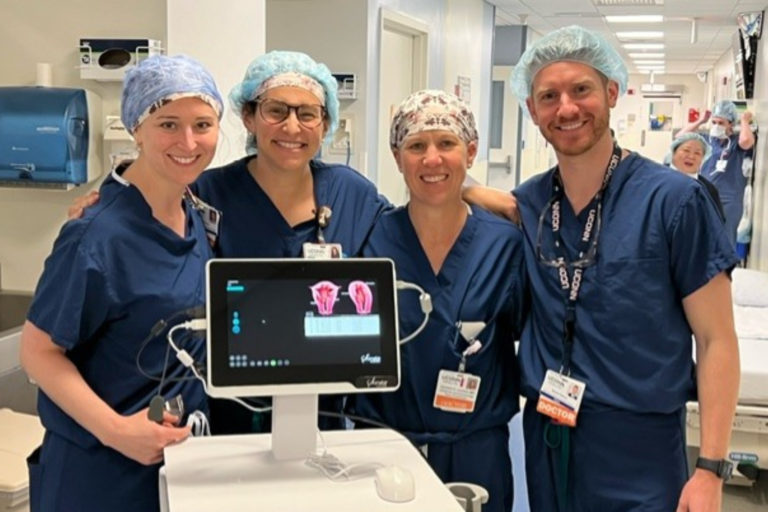Uterine fibroids are the most common noncancerous tumors of the reproductive tract and the most common cause of hysterectomy in the U.S. As many as 70% to 80% of women will experience uterine fibroids during their reproductive years, and about half of them will experience symptoms. These symptoms can include debilitating menstrual cycles, frequent urination, infertility, and painful intercourse.
UConn Health is the first and currently only health system in Connecticut to offer a cutting-edge, incision-free, transcervical solution for the treatment of uterine fibroids. The first case using the Sonata® procedure was performed in May of this year under the guidance of obstetrician-gynecologist Amanda Ulrich, MD, and her Minimally Invasive Gynecologic Surgery (MIGS) team.
For Jayme Sanchez of Meriden, the procedure came at just the right time to avoid high-risk surgery and change the quality of his life.
Sanchez has struggled with uterine fibroids since she was a teenager, endured debilitating period pain and even suffered a miscarriage before giving birth to her daughter, one of her four children, all born by Caesarean section.
“It was hard to go anywhere without the risk of flooding at any time,” Sanchez said.
A few years ago, she had a myomectomy (surgery to remove uterine fibroids) and tried a hormonal intrauterine device (IUD), which thins the uterine lining and reduces period pain, as well as being a very effective form of birth control. It doesn’t cure fibroids, but it can help relieve their symptoms. However, as she got older and had a previous C-section, her symptoms got worse and her period pain became more severe.
Last year, she became ill and went to the emergency room, where her hemoglobin level — the protein in red blood cells that carries oxygen to tissues — was low at 6 g/dL, compared with a normal level of 12 to 15 g/dL. Because she was at risk of a heart attack, she received blood transfusions and iron supplements. Even with the IUD in place, her period did not stop, and she soon began experiencing a recurrence of the symptoms that had previously brought her to the emergency room. At that time, she and her doctor agreed that she was bleeding too much and needed to get her fibroids under control.
“This is a breakthrough for women who suffer from uterine fibroids.” – Jaime Sanchez
Conventional treatments for uterine fibroids include medications and hormone therapy, hysterectomy (surgical removal of the uterus), myomectomy (surgical removal of uterine fibroids without affecting the uterus), and uterine artery embolization (an injection that blocks the blood vessels around the uterus, shrinking fibroids over time).
Her doctor recommended a hysterectomy and she sought a second opinion from Dr. Ulrich. Unfortunately, at the time, a hysterectomy was the only treatment available, but Dr. Ulrich explained that the procedure could be performed at the University of Connecticut using a robotic minimally invasive gynecologic surgery. Sanchez was at high risk, with a large uterus and fibroids attached to her anterior abdominal wall along with her bladder, putting her at high risk for damage to her bowels.
Her surgery was originally scheduled for March, but was postponed until May. During her pre-op appointment, she was nervous. She knew she needed a hysterectomy and there was no other option, but she was scared because it was a risky procedure. That’s when Dr. Ulrich said, “I’m going to show you something new.”
“When Jamie came in for her pre-op exam and I had just taken the Sonata course, she sat down and said, ‘I don’t think there’s anything else I can do, but I’m really nervous about having such major surgery.’ I showed her the Sonata brochure and told her she would be an excellent candidate and would be our first patient,” Ulrich says.

“I couldn’t believe it. I now had options other than a hysterectomy and I knew Dr. Ulrich was an incredible surgeon, so I had no hesitation in being his first patient,” Sanchez said. “It was a godsend. I don’t think it was a coincidence that my surgery date was postponed and that Dr. Ulrich had this new technology right before my surgery, it was divine intervention.”
The non-surgical Sonata® treatment uses radiofrequency energy to directly target uterine fibroids, shrinking them and significantly reducing common symptoms such as menorrhagia and painful periods.
During treatment, a high-resolution intrauterine ultrasound handpiece is used to locate, target, and treat individual fibroids with radiofrequency ablation, leaving the uterus and endometrium intact.
Sonata Treatment is a groundbreaking alternative to hysterectomy and myomectomy, treating uterine fibroids of various types, sizes and locations. Because fibroids are treated from within the uterus, Sonata Treatment does not require abdominal incisions, does not require surgical removal of tissue and preserves the uterus.
The treatment can be performed under sedation, and general anesthesia is not usually required for most patients. No incisions are made, which means less pain, less bleeding, and a faster recovery for patients. The treatment itself takes between 15 minutes and an hour, depending on the number and type of fibroids being treated. This new treatment has been proven to reduce symptoms, with half of treated women returning to normal activities the next day, and on average, returning to work in two days.
Sanchez felt better the next day and had one light period after the treatment, but no pain or cramping. Her uterus and fibroids began to shrink.
In clinical studies, approximately 90% of women saw a reduction in menstrual bleeding after 3 months, and 95% saw a reduction after 12 months. Over 50% of women returned to normal activities the next day. Additionally, 94% of patients were satisfied 2 and 3 years after the procedure.
“I knew I was Dr. Ulrich’s first patient, but I didn’t know I was the first in the state until my next appointment. I trusted Dr. Ulrich so much. She was always polite, honest and reassuring,” Sanchez says. “This is a game changer for women who suffer from uterine fibroids.”
UConn Health has been designated a Center of Excellence for Minimally Invasive Gynecologic Care. This prestigious designation sets UConn Health apart from other facilities. The rigorous accreditation demonstrates a global standard of surgical excellence. UConn Health also conducts cutting-edge research, providing cutting-edge treatments for patients. We also work closely with colleagues in other specialties, including colorectal surgery, urology, urogynecology, radiology and physical therapy, to optimize patient care and improve outcomes.
For more information about the services and treatments offered at UConn Health OB/GYN or to schedule an appointment with one of our physicians, visit the Charlotte Johnson Hollfelder Center for Women’s Health at UConn Health or call (866) 328-8086.


